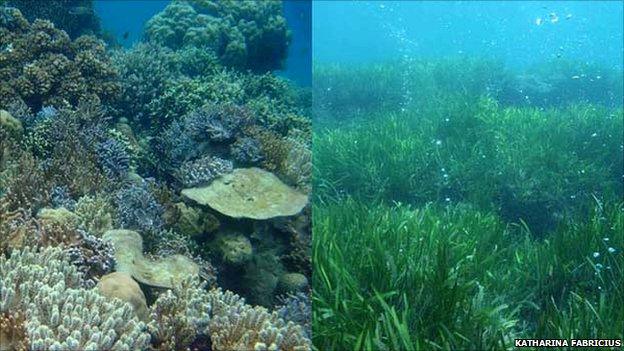An acid test for policy
- Published
- comments

Ocean acidification is a mechanism through which emissions can impact humanity's food supply
There's more this week on the critical but in some ways under-covered issue of ocean acidification, external.
At root, it's simple chemistry. Carbon dioxide goes into the air from factory chimneys and hearths and car exhaust pipes, and some of it ends up dissolved in seawater, as carbonic acid.
As carbon dioxide in the atmosphere now tops 380 parts per million (ppm), whereas the past few million years have seen oscillations between about 180 and 280ppm, it's hardly a surprise that seawater is now more acid than during this recent period of Earth history.
It's been much higher in previous ages; but as always, it's not just the scale of the change that's important, but the speed.
A new study in Nature Climate Change journal, external [released to journalists but not apparently on the journal website as yet] has tried to measure the current rate of change against what happened in pre-industrial times.
It's reliant on computer models to provide historical estimates; but with that caveat, the numbers are startling, suggesting that the current rate of acidification is two orders of magnitude bigger than what happened at the end of the last Ice Age.
Can marine animals, plants and ecosystems live with that? If so, what will the oceans look like in the future? Will they still be able to provide us with the food we need?
Some experiments in the laboratory and in "natural laboratories", where CO2 seeps into the sea from the slopes of underwater volcanoes, suggest problems ahead.
For example, just last week an Australian research team found, external that moderately enhanced CO2 levels in seawater affect the brain chemistry of fish, changing operation of neurotransmitter chemicals that carry messages between neurons.

Observation of a natural CO2 seep near Papua New Guinea shows a healthy reef (l) away from the vent, but just seagrass (r) nearby - a picture of the seas in years to come?
Some readers may already have fingers poised ready to write comments along the lines of "it's not a rise in acidity, it's a fall in alkalinity - so don't call it acidification".
And you'd be right. At pH8.1 and falling, seawater is heading from the alkaline towards neutral.
But although that point is correct, it's also irrelevant. Organisms and ecosystems adapt to whatever acidity or alkalinity they find, and need time to do so; and in some cases, such as with animals that need to form shells, adaptation may be impossible.
Anyway, there's a wealth of evidence out there that ocean acidification is of concern - perhaps even more than the climatic effects of CO2 emissions - so I'm not going to provide a catalogue here.
If it is of concern, you might think there would be some kind of international agency or treaty or framework charged with tackling it.
If you think that, you'd be wrong.
Acidification currently falls through the dividing lines that separate various UN institutions.
The climate change convention, external doesn't mention it, largely because it emerged as a potentially serious issue after the convention's establishment in 1992.
These days, acidification often crops up in speeches at the annual climate meetings, but rarely makes it into agreements.
Treaties on oceans, meanwhile, cover issues such as rights of access for shipping, fisheries, and pollution of the locally-acting kind.
And where should acidification fit, bearing in mind that the cause of the problem is so closely tied to the one supposedly being addressed in the climate convention whereas the impacts would be scattered around those relating to marine life, food and economic activity?
June's Rio+20 summit, external offers a way to put the issue on the tables of presidents and prime ministers; and it's a move being actively pursued.
Unesco's International Oceanographic Commission is one of the UN bodies keen to see acidification high up the Rio agenda; and this week, its executive secretary Wendy Watson-Wright explains why, external on the RTCC group's website.
As with climate impacts, there is an agenda concerned with dealing with the impacts of acidification, external, as well as the agenda concerned with reducing the trend itself.
A few years back, for example, scientists showed, external that keeping the fish population balanced and healthy on a reef offers some protection against impacts of rising water temperatures and acidity.
There's are ways to do this sort of thing through existing national and international mechanisms - provided the importance and the methods filter through.
Acidification is on the Rio agenda in the sense that the initial draft, external has a clause reading "We also propose to implement an international observing network for ocean acidification and to work collectively to prevent further ocean acidification".
Is that enough?